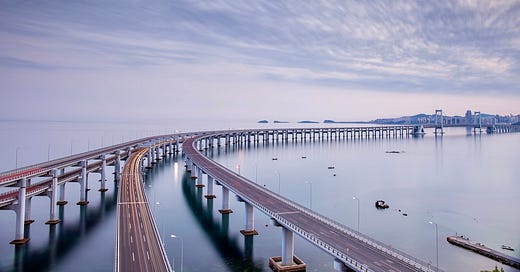Emerging Markets Daily - July 15
China GDP Q2 Growth Slows, EM 'Generational Opportunity?', China Tech and EM, Asian Bonds Attract Record Investment, Asia's Slow Air Travel Recovery
The Top 5 Emerging Markets Stories from Global Media - July 15
China's GDP Growth in Q2 Slows to 7.9%
Nikkei Asia
“China's gross domestic product growth slowed to 7.9% year-on-year in the April-to-June quarter after plateauing at 18.3% in the previous three months, signaling a halt to the V-shaped recovery from the COVID-19 pandemic.”
“…The swift deceleration was underlined by a 0.5% cut to banks' reserve requirements, effective Thursday, which is aimed at increasing lending to small and medium-size enterprises.”
“Only 26% of Chinese companies surveyed in June predicted a rise in business activity over the next year, down slightly from 28% in February, according to a business outlook by IHS Markit released on Monday. That was lower than the global average of 38%.” CK Tan reports
“Generational Opportunity” in Emerging Markets or More Staid Returns?
OilPrice.com
“A commonly heard refrain amongst investment circles is that emerging markets, or EMs, are no longer what they used to be over the past two decades. Coming out of the Global Financial Crisis, EM equities were the best performing regional equity market, returning 79% in 2009 compared to a 27% return by the S&P 500. But it's been pretty much downhill from there, with the EM lagging behind the Developed Markets (DM) with a 7% return vs. 13% by the DM (excluding the U.S.) in the current year.”
“A similar narrative has been playing out in the energy markets, with EMs hardly visible in the global ESG and renewable energy boom despite being the most vulnerable to climate change. But a cross-section of Wall Street is now saying not to give up on EMs just yet.”
“Investors and strategists at Goldman Sachs and JPMorgan Chase are saying there's plenty of value to be found in EM commodity markets regardless of whether or not OPEC+ can resolve its latest deadlock. In fact, some analysts have labeled it a ‘generational opportunity’.”
“‘A generational opportunity exists today in many of the deepest-value emerging markets. Whether you export goods or whether you export commodities, you're getting an external demand boom right now for pretty much whatever it is that you sell,’ Whitney Baker, the former head of emerging-market research at Bridgewater Associates, has told Bloomberg.” Alex Kimani reports.
China’s Tech ‘Not State-of-the-Art’, but it is what Emerging Markets can Afford
South China Morning Post
“Increasing hostility and challenges by developed countries will not deter China from boosting hi-tech investment under its grand infrastructure-connectivity plan known as the Belt and Road Initiative, according to analysts.”
“Their comments came after European Union foreign ministers agreed this week to launch a global infrastructure plan linking Europe with the world. This followed deals involving India and Japan, and a similar plan by the Group of 7 (G7) nations to rival China’s ambitious multibillion-dollar undertaking.”
“China has a strong foothold when it comes to investing in emerging markets – a trend that is likely to be reinforced under the Belt and Road Initiative, while Chinese policy banks are among the largest creditors to the developing economies.”
“‘The markets there for hi-tech products are less competitive than those of developed nations. They are relatively easy for Chinese brand hi-tech products to penetrate. Chinese branded hi-tech products with low prices, and not state-of-the-art technology, match perfectly with the demands of those countries, whose income determines what they can afford,’ said Xing Yuqing, an economics professor with the National Graduate Institute for Policy Studies in Tokyo.” Amanda Lee reports
Foreign Investors Flock to Asian Bonds
Hellenic Shipping News/Reuters
“Foreigners’ purchases of Asian bonds surged in June to the highest in two years, as a drop in U.S. bond yields spurred global investors to hunt for better returns amid a low yield environment worldwide.”
“Asia’s bond inflows last month presented a contrast with the outflow from its equity markets, which were hit by a resurgence of coronavirus infections, to cast doubt over the region’s economic outlook.”
“Overseas investors bought a net $10.2 billion worth of Asian bonds last month, in the 13th straight month of inflows, data from regulatory authorities and bond market associations showed.”
“U.S. 10-year Treasury yields dropped 11.3 basis points in June, on signs that the economic recovery from the pandemic could be slowing. ‘Real yield differentials over U.S. Treasuries are favourable for a few markets in Asia,’ OCBC analysts said in a note this month. This backdrop is conducive to foreign inflows in general.’”
“Foreigners purchased a net $8.3-billion worth of South Korean bonds, on expectations of a hike in its interest rates later this year. The holdings of overseas investors in South Korean bonds was at 8.7% by the end of June, the highest since at least 2009, the data showed.”
“A Reuters poll showed 28 out of 32 analysts saw a rate hike in the fourth quarter, while another two saw an increase coming as early as August. Indonesian and Thai bonds also attracted $1.4 billion and $1.3 billion respectively.”
“Indian and Malaysian bonds, on the other hand, faced outflows. Khoon Goh, head of Asian research at ANZ, said he expected the volatility to persist as investors weigh incoming U.S. data against expectations of the timing of the Fed’s bond tapering.”
Asia's Air Travel May Take Three Years to Recover from Covid-19
Straits Times / Bloomberg
“Asian air travel may take another three years to recover fully from the devastation wrought by the Covid-19 pandemic, lagging behind rebounds in other regions and offering a stern headwind for refiners making jet fuel.”
“It will take until 2024 for international air travel across the region to reach pre-virus levels, a year after global traffic hits that milestone, according to the International Air Transport Association (Iata). Similarly, consultancy Energy Aspects says jet fuel consumption will reach pre-pandemic volumes only in 2023-2024.” Elizabeth Low reports
What We’re Also Reading….
Oil Extends Losses on U.S. Stockpile Gain While UAE Nears Deal
Bloomberg
“Oil extended losses after U.S. gasoline stockpiles unexpectedly expanded, while signs the United Arab Emirates could get better terms under a compromised supply agreement raised concerns about OPEC+ unity.”
“Futures in New York slid below $73 a barrel after falling 2.8% on Wednesday, the most since mid-May. American inventories of gasoline and distillates -- a category that includes diesel -- both rose last week, offsetting an eighth weekly draw in crude stockpiles, according to government data.”
“The UAE is nearing a deal that could give the nation a more generous output limit next year and allow OPEC+ to lift supply in coming months, although talks with Saudi Arabia are ongoing, said delegates. However, the compromise may open the door for other members to redress their own grievances, with one delegate signaling Iraq would pursue a higher production baseline.”
Indonesia Overtakes India as Asia's New Covid-19 Epicenter
CNN
“Indonesia reported 54,517 new cases of Covid-19, authorities said Wednesday, a single-day national record and dire warning sign for the world's fourth-most populous country.”
“The island nation -- home to about 270 million people -- is now reporting more cases a day than hard-hit India, making Indonesia the new epicenter for the pandemic in Asia. If the spread continues unabated, experts say it could push Indonesia's health care system to the brink of disaster.”
“Some fear the situation may be worse than the numbers show, because not enough people are getting tested for the virus. A survey published Saturday found that nearly half of the 10.6 million residents of Jakarta may have contracted Covid-19.” Masrur Jamaluddin and Joshua Berlinger report




